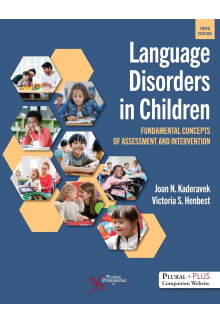- Titulinis
- Dalykinė ir mokslinė literatūra
- Socialinių mokslų knygos
- Edukologija
- Language Disorders in Children: Fundamental Concepts of Assessment and Intervention, Th...
Language Disorders in Children: Fundamental Concepts of Assessment and Intervention, Third Edition
Autorius : Joan N. Kaderavek
Leidimo metai: 2024
Leidėjas: Plural Publishing
Puslapių skaičius: 454
Leidinio kalba: Anglų
Formatas: Minkšti viršeliai
Now published by Plural, this modernized third edition of Language Disorders in Children: Fundamental Concepts of Assessment and Intervention offers a comprehensive overview of language disorders in children for speech-language pathology students. The expert authors bring together decades of clinical experience and pedagogical expertise to create a comprehensive resource with instructional strategies and clinical applications, enhanced with numerous activities, discussions, and case studies that promote critical thinking. This edition introduces a groundbreaking model that utilizes a story-based approach to explain the dimensions of choosing and developing interventions. This method engages students in a thought experiment that illuminates the nuances of clinical decision-making, particularly for children with developmental language disorder, autism, and other developmental disabilities. The book revisits and expands upon the well-regarded five communication subdomains framework, providing a clear and structured approach to understanding language development from early pragmatic skills to advanced discourse.
New to the Third Edition
- New coauthor, Victoria S. Henbest, PhD, CCC-SLP
- A color layout with refreshed illustrations to enhance visual comprehension
- Increased emphasis on multicultural considerations in assessment and treatment of child language disorders
- Added content on the use of technology in clinical practice
- Additional class activities and discussions to facilitate clinical thinking skills
- Updated ancillary resources for instructor and students
Key Features
- A two-step approach to language sample analysis is presented with clarifying case studies, figures, and directions for completing a language sample
- Chapter overview questions at the beginning of chapters serve as a road map for students
- QR codes direct readers to helpful video clips and web resources
- Boxed focus points effectively communicate the most crucial aspects of the text
- Bolded key terms and a comprehensive glossary help improve retention of the material
- Case studies and discussion and in-class activities encourage students to delve deeper into the material
- Concise chapter summaries end each chapter to reinforce key takeways
- Appendices containing valuable supplementary materials such as worksheets, case studies, language analyses guides, standard score interpretation tutorial, and assessment reports

